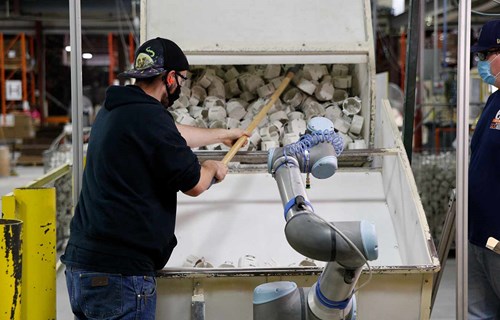Improving manufacturing efficiency with a cobot

Collaborative robots are now a part of our daily lives. Wherever we find humans working, cobots are working alongside them. Cobots help in various industries like the automobile industry, aerospace, and medical field, among many others.
Automation and robotics are widely used in the manufacturing industry, but emerging technology is taking it to the next level with cobots due to customer demands for fast delivery, more complex products, and a focus on keeping costs down.
What is a Cobot?
A collaborative robot is a global robotic automation technology adopted by businesses due to its versatility, programmability, and competency in various functions. A cobot typically works near the human employee to do the repetitive, mundane tasks or those tedious errands that humans dislike. A cobot looks and acts like a human, making it easier to work with. In addition, they have fewer safety issues and don't pose a threat to humans because they have sensors and shields around them.
As the name suggests, cobots are a combination of a robot and a human worker, allowing for seamless collaboration. As a result, you can streamline your production process, cut down costs, and improve efficiency with the right cobot. Read on this article to learn more about how cobots can help your business.
Where are cobots used?
Cobots help automate labor-intensive processes in pharmaceutical, manufacturing, and food & beverage industries, where labor costs are a considerable component of the overall cost. And with humans, productivity can be inconsistent due to things like fatigue, injury, mistakes, and a simple lack of engagement. In addition, there are numerous other areas like logistics, distribution and, warehousing.
You can find cobots in all kinds of factories today. Cobots help assemble parts, test objects, weld, and more in the automotive industry. In the electronics industry, they handle circuit board testing, while cobots handle precision surgery and setting bones in the medical industry. In the food and beverage, industry cobots handle food packaging. Finally, in the aerospace industry, cobots build airplanes.
Top Advantages of Using Cobots in Manufacturing
Cobots are automations that work beside humans. Unlike traditional manufacturing robots, where safety is a significant concern, cobots have human-like abilities to do things such as feel objects or sense movement around them.
With robots making more and more of the products we buy, it's paramount to know why they are becoming so popular in manufacturing. Here are some of the top reasons:
Machines can work around the clock – Robots don't have to rest and can be programmed to run 24/7. As a result, they provide more flexibility and get their products to markets faster than ever.
Convenience: Robots don't complain about long hours or short breaks. They can also perform tasks that humans cannot do, like lifting heavy objects or working in extreme temperatures.
Speed and precision: Cobots have enough artificial intelligence to safely work side-by-side with human beings, helping them to increase their manufacturing output by speeding up tasks, allowing them to produce higher quality products in less time. Robots can work at incredible speeds, which means products can be made more quickly.
In some cases, this allows for better quality control because machines don't tire or make mistakes like humans. Robots do not tire, and they do not make mistakes. As such, you can run them 24/7 if you want, meaning that you can produce much more quickly with a cobot.
Lower costs: Robots don't need benefits or a salary. Not only do they eliminate human labor costs, but they also reduce material costs. So even if you have to pay extra for the parts required in robot production, those costs are often offset by savings on labor and materials.
Why Cobots over Traditional Robots?
There are many reasons why robots are increasingly being deployed in factories. Here are benefits that manufacturers can enjoy when they choose to automate their production lines:
Quality
Robots never get tired and do not make mistakes. Their precision and consistency mean that products will be of a higher quality than those produced by human labor.
























